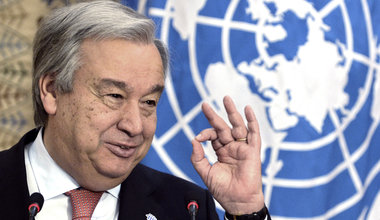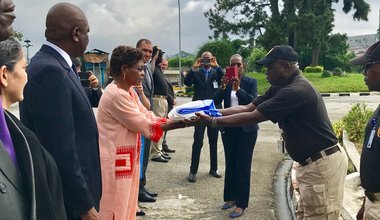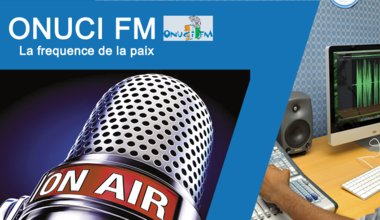Daily Brief on Cote d’Ivoire for Tuesday, 27 January 2009
Highlights
- SRSG Choi meets Civil Society Convention
- Bouaké Sous Prefet launches sensitisation on identification
SRSG's activities
The Special Representative of the UN Secretary-General for Côte d'Ivoire, Y.J. Choi, today met with a delegation of the Ivorian Civil Society Convention, who came to present him with a draft document for an initiative, known as days of consensus, which would bring together different sections of Ivorian society both at home and abroad to discuss the crisis resolution process. During the meeting, which was also attended by UNOCI section chiefs, Mr. Choi stressed the importance of civil society in the crisis resolution process. He told them "2009 will be decisive year for Côte d'Ivoire because identification will end by spring and disarmament should start before the summer". He told the delegation that the international community was counting on them to contribute to the success of the process.
Electoral process
The Sous-Préfet of Bouaké, with the assistance of UNOCI, today started a sensitization tour of several villages located along the Bouaké - Abidjan and Bouaké - Katiola roads in an effort to convince as many people as possible to take part in the identification and voter registration operation. However there is serious concern over the fact that 99% of the civil registers in Bouaké sous-préfecture are said to have been lost or destroyed. This could result in a large number of the people being left out of the operation.
Security
The Lycée technique in Yamoussoukro reopened yesterday after it was closed down by local education authorities following a violent exchange between two student groups last week. On 22 January 2009, approximately 50 members of the student's union, the "Fédération Estudiantine et Scolaire de Côte d'Ivoire" (FESCI) armed with various weapons, physically assaulted members of a rival union the "Collectif des Etudiants des Grandes Ecoles et Elèves de l'Enseignement Professionnel et Technique de Côte d'Ivoire" (CEGEPT-CI) and two teachers following a private dispute between two students. Five CEGGPT-CI students were injured, two of them seriously injured. FESCI members also looted students' accommodation. The police had to intervene with teargas to end the violence although no arrests were made.
Humanitarian
The Sous-préfet of Zéaglo, 20 km from Blolequin (west) has launched a sensitisation campaign among local youths in preparation for the return of internally displaced persons (IDPs) to plantations which they were forced to abandon during the Ivorian crisis. It should be recalled that the local authorities have encountered serious problems from host communities with regard to the return of IDPs to their farms. On 16 January 2009, the Sous Prefet of Bloléquin was forced to send military reinforcements to Keibly village after a group of young people threatened to attack Baoulé planters who had returned to their plantations. This week, youths in Béoué, are threatening to take action against IDPs, whom they claim are refusing to share their plantations with them, as agreed.
Human Rights
The Regional Human Rights Office in Bouaké has referred the case of a man from Gbréyagadougou, 74 km north-east of Bouaké, who was allegedly beaten up and tortured by soldiers from the Armed Forces of the Forces Nouvelles (FAFN), to the Dabakala Zone Commander. The Office also succeeded in getting the alleged victim's motorcycle, which had been confiscated by the soldiers, returned to him. According to the alleged victim, the soldiers, who are based in Satama-Sokouro, 64 km north-east of Bouaké, physically assaulted him while he was in detention from 6 to 16 January 2009 for owing 360,000 FCFA (approx $700). He claimed he was repeatedly beaten up with truncheons and iron rods and branded on his back and buttocks with a hot machete. He was released after paying his debt.
On 23 January 2009, the Regional Human Rights Office in Odienné (north), in collaboration with the local NGO "African Union Club", and the theatre group "Bêhitafô", organized a human rights awareness-raising campaign at Korondougou and Sokorodougou, 20 km and 61 km, south of Odienné, respectively. The programme, which was financed by the Canadian Embassy, focused on violence against women, female genital mutilation, early and/or forced marriages as well as the right of children, especially young girls, to education. More than 500 people, mostly women and children, participated in the session. Sketches depicting various human rights violations, including those related to women and children were presented by the theatre group.
 ONU
ONU Nations Unies Maintien de la paix
Nations Unies Maintien de la paix




